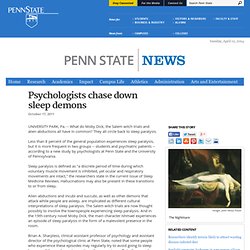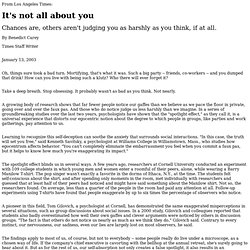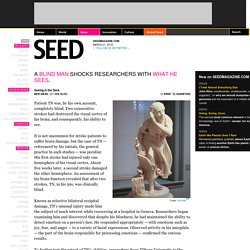

Can walking through a doorway make you forget? & Dr Karls Great Moments In Science (ABC Science) Dr Karl › Dr Karl's Great Moments In Science If you experience memory lapses when moving from one room to the next then you're not alone.

Dr Karl wonders why we sometimes forget what we came for. By Karl S. Kruszelnicki Your memory is a funny thing. Or have you ever gone to the kitchen because you were thirsty and then forgotten why you were there? What's going on? Now for a bit of essential background. Also, the universe is a dangerous place. At least, that's the result of a psychology experiment by Dr Radvansky and colleagues from the University of Notre Dame in Indianapolis in the USA. He was exploring these memory lapses in terms of what psychologists call an event-horizon model.
Secondly, if you're concentrating on something, it will take up most of your attention and everything else gets pushed into the background. And finally, different parts of your memory system compete with each other to try and retrieve information. Psych Central News - StumbleUpon. By Rick Nauert PhD Senior News Editor Reviewed by John M.

Grohol, Psy.D. on January 24, 2012 Provocative new research discovers small-group dynamics can lower the expression of IQ in some susceptible people. In the study, researchers determined IQ is significantly linked to social context. During the investigation, scientists from the Virginia Tech Carilion Research Institute found that settings such as jury deliberations, collective bargaining sessions, and cocktail parties may reduce cognitive ability. “You may joke about how committee meetings make you feel brain dead, but our findings suggest that they may make you act brain dead as well,” said Read Montague, Ph.D., director of the Human Neuroimaging Laboratory and Computational Psychiatry Unit, who led the study. Researchers used functional magnetic resonance imaging (fMRI) to investigate how the brain processes information about social status in small groups and how perceptions of that status affect expressions of cognitive capacity.
Joshua Klein on the intelligence of crows. Why Humans Are So Smart…and Groovy. Grooved fingers make us smart. ...as do grooved brains. When you are next in the shower, take a look at your wrinkled fingers. They aren't pretty to look at, but they help make you smart. Pruney fingers are not an accidental side effect of getting soaked as is typically believed, but are, instead, highly efficient rain treads that help us primates grip the world when it is wet ( something we've recently been studying in the lab ). Without wrinkled fingers you would need to possess two categories of behavior, one for dry conditions, and one for wet.
That would require more brain space than you can spare. Your wrinkles do a great job for your brain despite the fact that they are not smart in and of themselves -- they are inflexible, automatic switches, only knowing to do two things: wrinkle when wet, unwrinkle when dry. The strategy of "subcontracting" out brain responsibilities to low-brow reflex-like mechanisms is one of the oldest tricks in evolution's book. Penn State Live - Psychologists chase down sleep demons. UNIVERSITY PARK, Pa. -- What do Moby Dick, the Salem witch trials and alien abductions all have in common?

They all circle back to sleep paralysis. Less than 8 percent of the general population experiences sleep paralysis, but it is more frequent in two groups -- students and psychiatric patients -- according to a new study by psychologists at Penn State and the University of Pennsylvania. Sleep paralysis is defined as "a discrete period of time during which voluntary muscle movement is inhibited, yet ocular and respiratory movements are intact," the researchers state in the current issue of Sleep Medicine Reviews. Hallucinations may also be present in these transitions to or from sleep. Alien abductions and incubi and succubi, as well as other demons that attack while people are asleep, are implicated as different cultural interpretations of sleep paralysis. Brian A. He looked at a total of 35 published studies from the past 50 years to find lifetime sleep paralysis rates. Welcome to Adobe GoLive 6.
From Los Angeles Times: It's not all about you Chances are, others aren't judging you as harshly as you think, if at all.

By Benedict Carey. Seeing in the Dark & SEEDMAGAZINE.COM - StumbleUpon. Credit: cliff1066tm.

Patient TN was, by his own account, completely blind. Two consecutive strokes had destroyed the visual cortex of his brain, and consequently, his ability to see. It is not uncommon for stroke patients to suffer brain damage, but the case of TN — referenced by his initials, the general practice in such studies — was peculiar. His first stroke had injured only one hemisphere of his visual cortex.
About five weeks later, a second stroke damaged the other hemisphere. 10 Psychological Experiments That Went Horribly Wrong. Psychology as we know it is a relatively young science, but since its inception it has helped us to gain a greater understanding of ourselves and our interactions with the world.

Many psychological experiments have been valid and ethical, allowing researchers to make new treatments and therapies available, and giving other insights into our motivations and actions. Sadly, others have ended up backfiring horribly — ruining lives and shaming the profession. Here are ten psychological experiments that spiraled out of control. 10. Stanford Prison Experiment Prisoners and guards.